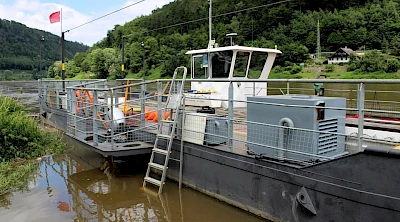Derweil in Tschechien... 37/25
26.09.2025
Close race in Czech elections
One week before the parliamentary elections, pollsters are predicting a tight race. The ANO party of former Prime Minister Andrej Babiš is still clearly leading the polls. However, according to all polling institutes, ANO is losing ground in the final stages and is now no longer above 30 percent. But the first runner-up, the governing coalition Spolu of Prime Minister Petr Fiala (ODS), is also losing ground in the polls and, unlike a few weeks ago, is now below 20 percent. In contrast, smaller parties are making gains, particularly the Pirates (almost 12 percent) and the Motorists (around 7 percent), while slight increases in the polls are also reported for the mayoral party STAN (almost 12 percent).
This means that ANO will almost certainly win the parliamentary elections, but will face a difficult time forming a government. On the one hand, this is due to the fact that seven alliances from no fewer than 13 parties now have a real chance of entering parliament. Added to this are the gains made by smaller parties. ANO would therefore have to include at least two, if not three, parties as coalition partners in the government. The right-wing populist party SPD has the best chances. Hopes are also pinned on the alliance Stačilo! (Enough is enough), which is based on the merger of the Communists and Social Democrats, and the Motorists.
Polling stations will open on Friday, October 3, at 2 pm. You can vote until 10 pm. Voting will then continue on the second day, October 4, at 8 am and end at 2 pm. We can therefore expect reliable election results on Saturday evening.
Teachers' salaries and pensions to rise
Teachers and pensioners in the Czech Republic can look forward to more money. From January, teachers' salaries are to rise by 7 percent. This has been agreed between the trade unions and Education Minister Mikuláš Bek. However, the government still has to give its approval. Other professional groups in the public sector can also look forward to higher wages. Salaries for firefighters are set to rise by 5 percent.
Teachers have been covered by a regular statutory pay rise for two years. This stipulates that their salary must be 130 percent of the average gross wage. In the second quarter of this year, this was 49,402 crowns, the equivalent of around 2,033 euros. The teacher's salary would therefore have to be around 2,650 euros by law.
Ferry in Dolní Žleb goes back into operation

After a break of almost a year, the car ferry in Dolní Žleb is back in operation. Passengers and vehicles are to be transported across the Elbe again from October.
The town of Děčín, to which the ferry belongs, had been looking for a new operator for almost a year. The last operator ceased operations in November last year. After two unsuccessful tender procedures, Děčín was successful after all. The new operator has already taken over the ferry.
The reason for the long search was, on the one hand, the strict conditions imposed on ferry operators, which are equivalent to those for skippers of inland cargo vessels. In the meantime, the Czech Republic has succeeded in softening these strict conditions for ferrymen. But one reason was also money. While the last operator was still available for 300,000 crowns a year, the new operator charges 1.5 million crowns (almost 62,000 euros) a year. The contract runs for two years.
The ferry runs daily between 8 a.m. and 6 p.m., unless the water level is too high or too low. It is one of the last yaw rope ferries in the Czech Republic and is mainly used by tourists as well as locals. While the village of Dolní Žleb is located on the left bank of the Elbe, the ferry ends on the right bank at highway 62 from Děčín to Hřensko.
New cycle path from Česká Kamenice to Kamenický Šenov

A new cycle path connects the two towns of Česká Kamenice and Kamenický Šenov. The route, which is designed not only for cyclists but also for inline skaters, now ensures greater safety. Until now, cyclists had to use the busy main road. At the same time, the route leads through the charming and protected landscape of the Bohemian Central Mountains. It was built along a railroad line and therefore also has a comfortable gradient.
The new cycle path is a joint project between the two towns, which was also supported by the districts of Ústí nad Labem and Liberec, as it crosses the border between the two districts. However, most of the money came from the state coffers. There is also a connection to another municipality with the branch to Prysk.
In Česká Kamenice, cyclists have a good connection to cycle paths to Stará Oleška or Kunratice and on to Všemily as well as to the Ploučnice cycle path. In Kamenický Šenov, however, the cycle path ends at the train station. However, there are already plans to continue at least as far as the Herrenfelsen (Panská skála) with its typical basalt organ pipes in the near future. Later, the cycle path is to be extended to Česká Lípa.
Fewer eight-year grammar schools
Two districts in the Czech Republic are planning to reduce the number of eight-year grammar schools. While the East Bohemian district of Hradec Králové wants to abolish some classes with eight-year grammar schools for the first time in the coming school year and replace them with four-year grammar schools, the Central Bohemian district has already started this and will continue with the project in the next school year.
In the Czech Republic, elementary school lasts five years. After that, for the first time, there is the option of switching to a so-called eight-year grammar school. A second option is to switch to the eight-year grammar school after seven years. However, most pupils switch to the Gymnasium after nine years, where they take the Abitur within four years. This last option is now to be strengthened in both districts.
The plans are primarily based on the recommendations of education experts. They see the disadvantage of early selection in the eight-year grammar school. In contrast, eight-year grammar schools are very popular with parents. Every year, there is a huge battle for the few places available, which also benefits specialized and not entirely cheap tutoring agencies that prepare the predominantly eleven-year-old primary school pupils for the demanding entrance exams.
North Bohemian winegrowers enjoy a good harvest
Winegrowers in the traditional winegrowing regions on the slopes of the Elbe around Litoměřice and Roudnice are facing an average, if not slightly above-average harvest this fall. Everything now depends on whether the harvest is not affected by too much rain in the last few meters. One way or another, however, this year's problem will not be the same as last year. Back then, a large part of the harvest was destroyed by late frosts in spring, similar to Saxony.
